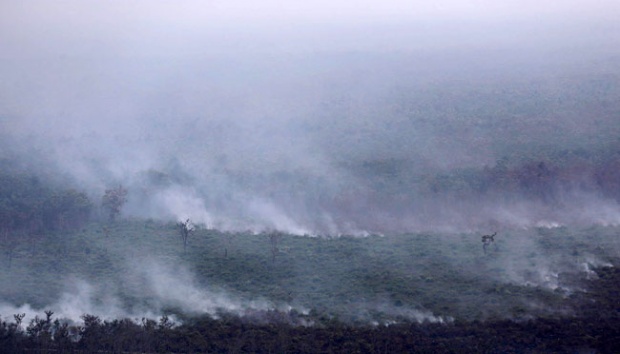
TEMPO.CO, Jakarta - The trail that acquitted Frans Katihokang, the operations manager of Langgam Inti Hibrindo, was nothing more than a farce. Frans, the suspect in the fire on a 544-hectare land plot in Riau's Pelalawan Regency, walked scot-free. The judge ruled that the fire was not deliberate and did not cause any environmental damage.
The presiding justice of the Pelalawan panel of judges, I Dewa Gede Budhi Dharma, and member Judge Weni Warlia seemed to have lost their senses and appeared distracted when they read out the verdict. They completely disregarded the prosecution's demand that Frans serve two years in jail and pay Rp1 billion fine or an additional six months in lieu of the fine.
All the expert witnesses, including a professor from the Bogor Agriculture Institute (IPB), confirmed that the fire had caused damages to the chemical, biological and physical properties of the soil and also lowered the peatland's surface by 30 centimeters. Only another member of the panel, Judge Ayu Amelia, accepted the explanation and eventually voiced her dissenting opinion to the verdict.
Judge Budhi Dharma's ruling was yet another discouraging precedent in cases involving forest fires. Those who ignited fire-usually for land clearance to transform it into new plantation fields-now hide behind the 'no environmental damage' claim. The same preposterous claim was used by Judge Parlas Nababan of Palembang district court to acquit Bumi Mekar Hijau company. He concluded the fire on the 20,000-hectare land owned by the Sinar Mas Group did not harm the environment as plants still grew on the land after the fire!
Astonishingly, Judge Budhi Dharma and Weni also failed to see the disastrous effects of the blaze. According to a calculation of National Disaster Mitigation Agency, last year's fire had resulted in the emission of 1.043 billion tons of carbon dioxide. Riau was one of the worst-hit provinces from the toxic smoke. Thousands of people suffered from acute respiratory infections, and five million schoolchildren were forced to stay at home for a month.
The violations by Frans and his company are quite evident. As asserted by Judge Ayu in her dissenting opinion, the environmental damage, for example, could easily be proven by the high level of smoke that exceeded the safe limits.
The negligence of Frans and his company in putting out the fire was also evident. According to the analysis on the environmental impact documents, the leased lands were situated in Afdeling Gondai, a fire-prone area. The company should have put in place the necessary fire-extinguishing equipment. But in fact, when the fire began to spread to the company's area, the staff had to travel for one and a half hour simply to get hold of the equipment. This clearly violates Government Regulation No. 4/2001 on Containing Damage and Pollution to the Environment, which stipulates that companies are required to protect the forests abutting the fields they lease.
The current trend of exonerating forest fire suspects call for serious attention from the Judicial Commission and the forestry and the environment ministry and warrants an audit to see if these judges understand the issue of forest fires and their destructive consequences.
To put an end to such impunity, a new set of regulations is needed to ensure that only judges holding certification in environmental law should handle cases involving forest fires. Otherwise, there will be more absurd verdicts such as those handed down by Judges Nababan and Budhi Dharma, which could spell the end for Indonesia's forests. (*)
Read the full story in this week's edition of Tempo English Magazine























